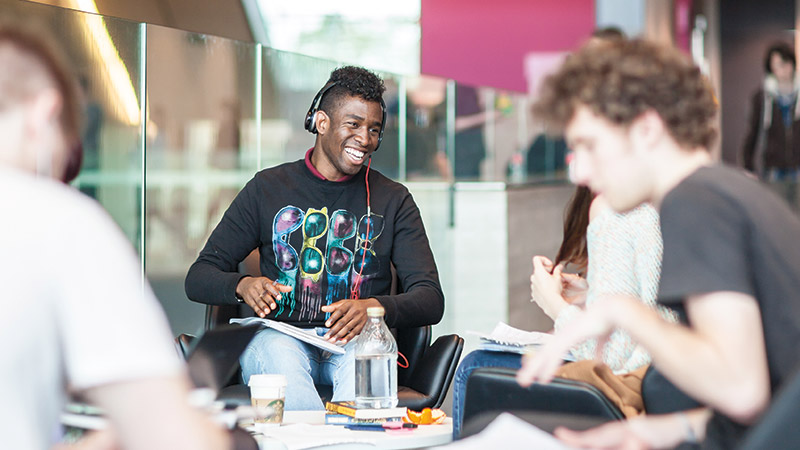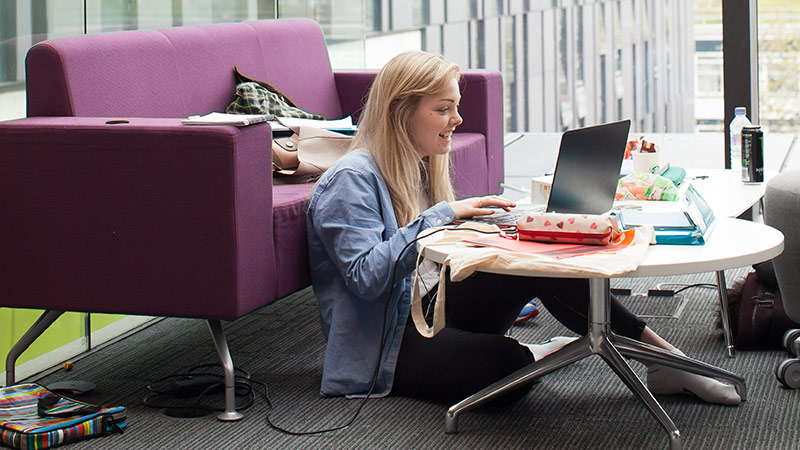Sport and Exercise Science
BSc (Hons)
UCAS code: C601
Start dates: September 2026
Full time: 3 years
Part time: part-time study is possible
Location: Headington
School(s): School of Sport, Nutrition and Allied Health Professions
Overview
Fascinated by how the body responds to physical activity? Keen to work with sports professionals to help them reach their best? And want to impact societal health issues?
With this Sport and Exercise degree, endorsed by the Chartered Association of Sport and Exercise Sciences, (CASES), it will help you to explore these topics and analyse the impact of exercise science.
You’ll cover a range of core subjects including biomechanics, physiology and psychology as well as optional modules such as nutrition, strength and conditioning, and performance analysis. Our specialist labs will give you plenty of scope to test results. Plus, members of our teaching team have a strong track record in helping elite sports teams.
In recent years, the government has recognised the benefits of the population being involved in physical activity and has invested heavily in sport. More people than ever go to the gym or get involved in some form of exercise. And sports professionals expect a whole raft of people to fine tune their performance. All this means you’ll be in great demand when you graduate.

Why Oxford Brookes University?
-
A field trip to Morocco
Spend a week in the Moroccan High Atlas Mountains, testing the effects of mountain trekking on your body. This gives you real data to analyse on your return.
-
Links with local clubs
Benefit from our strong network which gives plenty of scope for interesting work placements so you can impress employers with your practical experience.
-
Top-of-the-range facilities
Make use of our specialist labs to look at physiological responses or biomechanics and motion analysis. Plus, try out our hi-tech strength and conditioning suites.
-
Our Inside Track programme
Be inspired by a range of industry experts at our popular mentoring events. And learn what a career in sport science is like in the real world.
-
Additional language modules
Our university-wide language programme is available to full-time undergraduate and postgraduate students on many of our courses, and can be taken as a credit on some courses.
-
Study abroad
You may be able to go on a European or international study exchange while you are at Brookes. Most exchanges take place in the second year. Although we will help as much as we can with your plans, ultimately you are responsible for organising and funding this study abroad.
-
Accreditation(s)
Accreditated by the Chartered Institute for the Management of Sport and Physical Activity (CIMSPA) and 31 Cases.
Course details
Study modules
Please take note of the following modules marked as below:
- # can be studied in semester 1 or semester 2
- * modules required for CIMSPA personal training award
- ** alternate compulsory (choose at least 1).
Contact hours involve activities such as lectures, seminars, practicals, assessments, and academic advising sessions. These hours differ by year of study and typically increase significantly during placements or other types of work-based learning.
Please note: As our courses are reviewed regularly as part of our quality assurance framework, the modules you can choose from may vary from those shown here. The structure of the course may also mean some modules are not available to you.
Careers
As well as building up specific subject knowledge, you’ll develop general skills over the programme such as communication, teamwork and leadership – all highly rated by today’s employers.
With the increased focus on the importance of an active lifestyle for everyone, you’ll find there are many job opportunities in sport and health. And with the greater use of technology, there’s an even wider range of roles you can step into as an exercise scientist.
You might choose to follow in the footsteps of some of our graduates in roles such as:
- professional sports coach
- personal trainer
- performance analyst
- strength and conditioning practitioner at sports clubs/gyms
- rehabilitation specialist
- health promotion
- sports development officer/community support
- sports scientists in sports clubs
- clinical exercise physiology in cardiac rehabilitation (NHS)
- graduate entry into the forces.
Other graduates decide to specialise in a particular area of their studies and go on to do a research-based master’s course related to their degree.
Student profiles
Entry requirements
Wherever possible we make our conditional offers using the UCAS Tariff. The combination of A-level grades listed here would be just one way of achieving the UCAS Tariff points for this course.
Standard offer
UCAS Tariff Points: 120
A Level: BBB
IB Points: 31
BTEC: DDM
Contextual offer
UCAS Tariff Points: 96
A Level: CCC
IB Points: 28
BTEC: MMM
Specific entry requirements
A Level: Including one A Level or a comparable Level 3 qualification in a science subject (e.g. Biology, Chemistry, Maths, Physical Education, Physics, Psychology).
- Ability to demonstrate an interest in sport.
- If you do not have a background in science, we encourage you to consider our Life Sciences Foundation year.
- Please also see the University's general entry requirements.
Please also see the University's general entry requirements.
English language requirements
An IELTS score of 6.0 overall (6.0 in Reading and Writing, 5.5 in Speaking and Listening) is required for all applicants whose first language is not English.
Please also see the University's standard English language requirements.
Pathways courses for international and EU students
If you do not meet the entry requirements for this degree, or if you would like more preparation before you start, you can take an international foundation course. Once you enrol, you will have a guaranteed pathway to this degree if you pass your foundation course with the required grades.
If you only need to meet the language requirements, you can take our pre-sessional English course. You will develop key language and study skills for academic success and you will not need to take an external language test to progress to your degree.
English requirements for visas
If you need a student visa to enter the UK you will need to meet the UK Visas and Immigration minimum language requirements as well as the University's requirements. Find out more about English language requirements.
Credit transfer
Many of our courses consider applications for entry part-way through the course for students who have credit from previous learning or relevant professional experience.
Find out more about transferring to Brookes. If you'd like to talk through your options, please contact our Admissions team.
Terms and conditions of enrolment
When you accept our offer, you agree to the Terms and Conditions of Enrolment. You should therefore read those conditions before accepting the offer.
International qualifications and equivalences
How to apply
Application process
Full time international applicants can also apply through UCAS
Tuition fees
Questions about fees?
Contact Student Finance on:
Tuition fees
Please note, tuition fees for Home students may increase in subsequent years both for new and continuing students in line with an inflationary amount determined by government. Oxford Brookes University intends to maintain its fees for new and returning Home students at the maximum permitted level.
For further information please see our tuition fees FAQs.
Tuition fees for International students may increase in subsequent years both for new and continuing students.
The following factors will be taken into account by the University when it is setting the annual fees: inflationary measures such as the retail price indices, projected increases in University costs, changes in the level of funding received from Government sources, admissions statistics and access considerations including the availability of student support.
How and when to pay
Tuition fee instalments for the semester are due by the Monday of week 1 of each semester. Students are not liable for full fees for that semester if they leave before week 4. If the leaving date is after week 4, full fees for the semester are payable.
- For information on payment methods please see our Make a Payment page.
- For information about refunds please visit our Refund policy page
Financial support and scholarships
Additional costs
Please be aware that some courses will involve some additional costs that are not covered by your fees. Specific additional costs for this course are detailed below.
You will be expected to participate in practical activities, which will require appropriate general sportswear.
Information from Discover Uni
Full-time study
Part-time study
Programme changes:
On rare occasions we may need to make changes to our course programmes after they have been
published on the website. For more information, please visit our
changes to programmes page.




